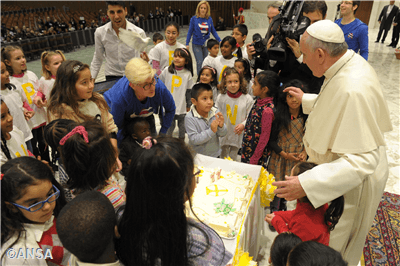Pope Benedict met with diplomatic representatives of Muslim nations and Italian Muslim leaders on Monday to discuss the reaction to his now-famous speech at Regensburg. He emphasized the importance of Muslims and Christians working together, especially in places like the United Nations, to combat modern anti-religious secular humanism and various efforts of social re-engineering.
In fact, when you hear the Pope speak of making “common cause” with Muslims and having “deep respect” for them, that’s probably what he’s referring to. Over the past 10 years or so at the UN, whenever one of these efforts to undermine traditional morality have come up—including attempts to force abortion, sterilization, and contraception on the world or to legalize things like cloning and embryonic stem-cell research—it has usually been the Vatican, a few Latin American Catholic countries, and a huge bloc of Islamic countries holding the line. Most of historically Catholic Europe has been generally in favor of such efforts—their UN delegations often co-opted by radical leftists—and even the US was complicit until the Clinton administration ended.
So in his talk at Castel Gandolfo, the Pope emphasized the points he was trying to make in Regensburg: that Christians and Muslims should work together to fight relativism and defend traditional morality and that they should eschew the use of violence as a religious weapon.
This is all very well and good, but the main problem here is that no matter how happy the Muslims present at today’s meeting were, it does not mean that this will get out to the masses. By its very nature, Islam is not hierarchical. Every imam and sheikh and and other religious leaders will appeal to their own theological traditions and customs, but in the end it’s like millions of non-denominational Pentecostal preachers, all leading their own congregations using their own interpretation of Scripture. In addition, Islam’s theology is inescapably bound up with politics and if some imam or sheikh or or terrorist or government leader somewhere decides that keeping people unhappy over the Pope’s remarks is good for the own goals, they will do so. It’s not about reason or religious tradition, but about what will advance the ideology.
Update: Amy Welborn provides an excellent point about what Pope Benedict said:
Note that what is so common in conversations about such things in this country, especially on a less-academic level - a declaration that it is vitally important to engage in dialogue so that we expand our own theological vision is not part of Benedict’s framework.
... The point is this: we live in a world fraught with the threat of violence, and deep with suffering. The purpose of inter-religious dialouge is to diminish these threats, to clear the way so that people of all religious backgrounds can work together to alleviate human suffering.
Technorati Tags:interreligious dialogue, Islam, Pope, Regensburg




